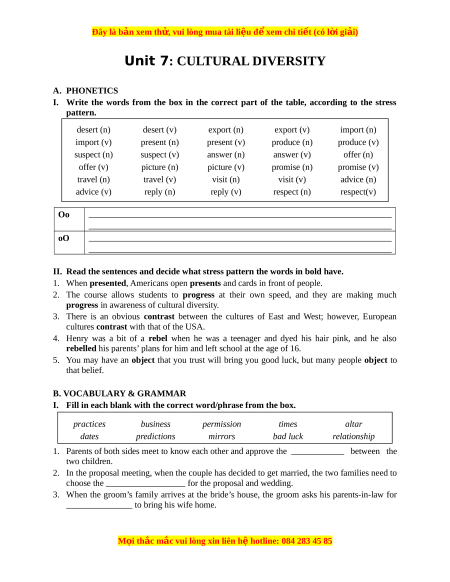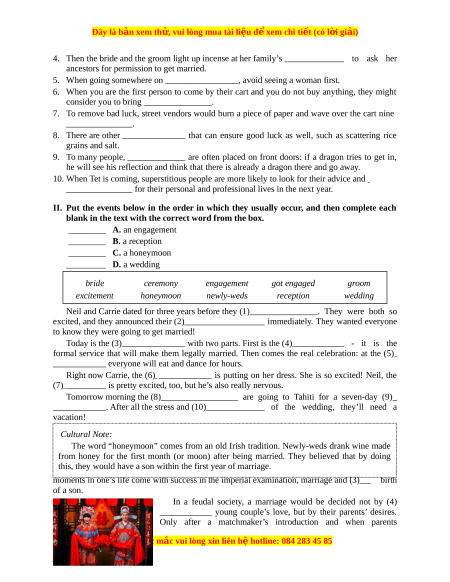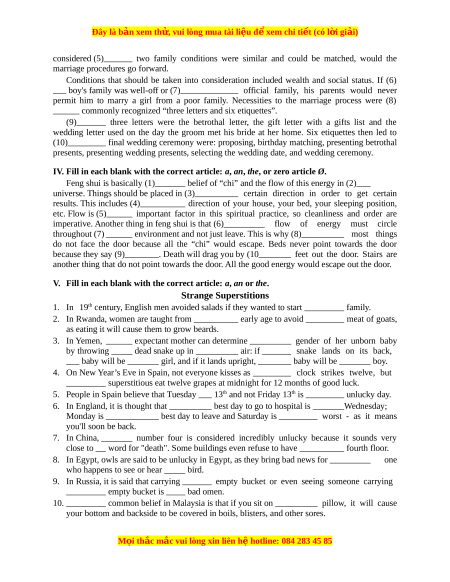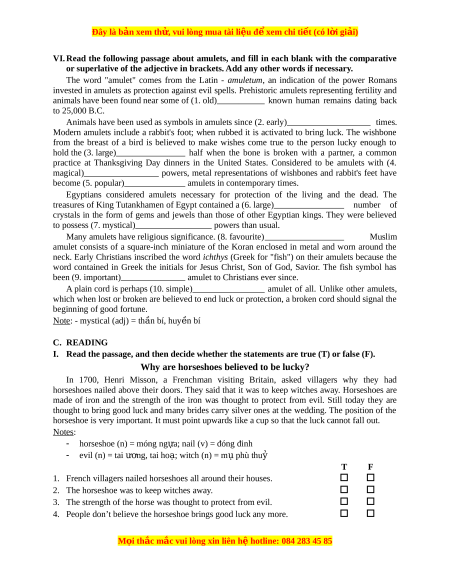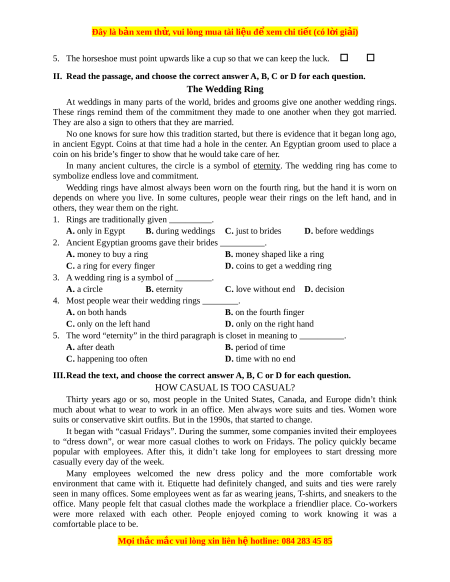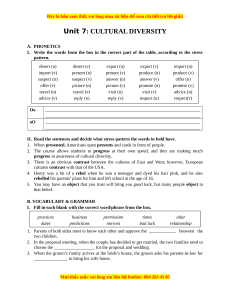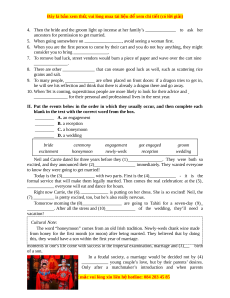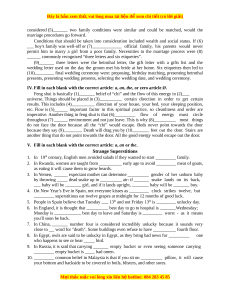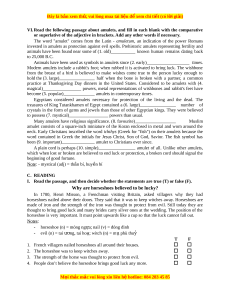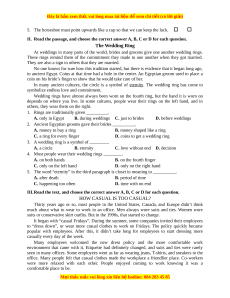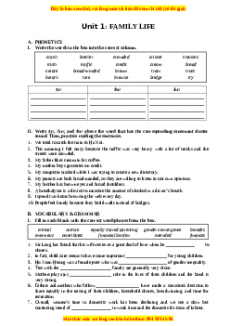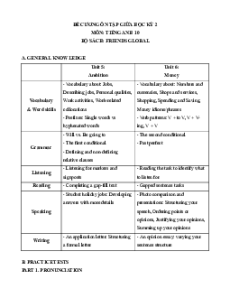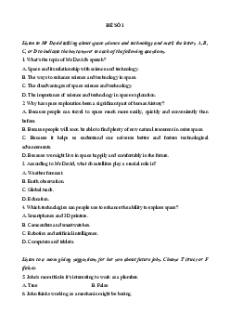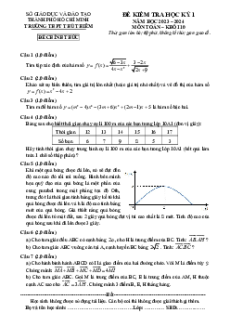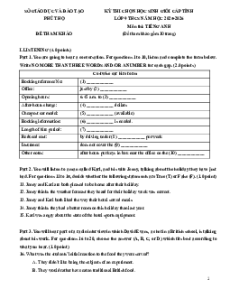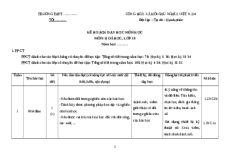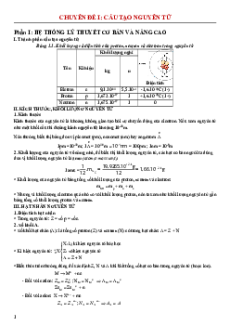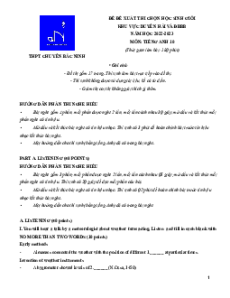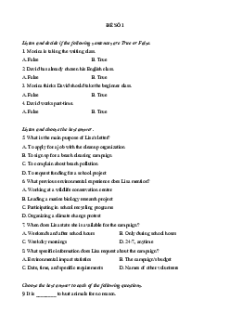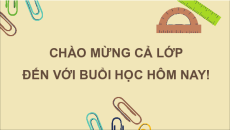Đây là bản xem th , vu ử i lòng mua tài li u ệ đ xe ể m chi ti t ế (có l i ờ gi i ả )
Unit 7: CULTURAL DIVERSITY A. PHONETICS
I. Write the words from the box in the correct part of the table, according to the stress pattern. desert (n) desert (v) export (n) export (v) import (n) import (v) present (n) present (v) produce (n) produce (v) suspect (n) suspect (v) answer (n) answer (v) offer (n) offer (v) picture (n) picture (v) promise (n) promise (v) travel (n) travel (v) visit (n) visit (v) advice (n) advice (v) reply (n) reply (v) respect (n) respect(v) Oo oO
II. Read the sentences and decide what stress pattern the words in bold have.
1. When presented, Americans open presents and cards in front of people.
2. The course allows students to progress at their own speed, and they are making much
progress in awareness of cultural diversity.
3. There is an obvious contrast between the cultures of East and West; however, European
cultures contrast with that of the USA.
4. Henry was a bit of a rebel when he was a teenager and dyed his hair pink, and he also
rebelled his parents’ plans for him and left school at the age of 16.
5. You may have an object that you trust will bring you good luck, but many people object to that belief. B. VOCABULARY & GRAMMAR
I. Fill in each blank with the correct word/phrase from the box. practices business permission times altar dates predictions mirrors bad luck relationship
1. Parents of both sides meet to know each other and approve the between the two children.
2. In the proposal meeting, when the couple has decided to get married, the two families need to choose the for the proposal and wedding.
3. When the groom’s family arrives at the bride’s house, the groom asks his parents-in-law for to bring his wife home. M i
ọ thắc mắc vui lòng xin liên h h
ệ otline: 084 283 45 85
Đây là bản xem th , vu ử i lòng mua tài li u ệ đ xe ể m chi ti t ế (có l i ờ gi i ả )
4. Then the bride and the groom light up incense at her family’s to ask her
ancestors for permission to get married. 5. When going somewhere on , avoid seeing a woman first.
6. When you are the first person to come by their cart and you do not buy anything, they might consider you to bring .
7. To remove bad luck, street vendors would burn a piece of paper and wave over the cart nine . 8. There are other
that can ensure good luck as well, such as scattering rice grains and salt. 9. To many people,
are often placed on front doors: if a dragon tries to get in,
he will see his reflection and think that there is already a dragon there and go away.
10. When Tet is coming, superstitious people are more likely to look for their advice and
for their personal and professional lives in the next year.
II. Put the events below in the order in which they usually occur, and then complete each
blank in the text with the correct word from the box.
_________ A. an engagement
_________ B. a reception
_________ C. a honeymoon __________ D. a wedding bride ceremony engagement got engaged groom excitement honeymoon newly-weds reception wedding
Neil and Carrie dated for three years before they (1) . They were both so
excited, and they announced their (2)
immediately. They wanted everyone
to know they were going to get married! Today is the (3)
with two parts. First is the (4) - it is the
formal service that will make them legally married. Then comes the real celebration: at the (5)
everyone will eat and dance for hours. Right now Carrie, the (6)
is putting on her dress. She is so excited! Neil, the (7)
is pretty excited, too, but he’s also really nervous. Tomorrow morning the (8)
are going to Tahiti for a seven-day (9)
. After all the stress and (10)
of the wedding, they’ll need a vacation! Cultural Note: III.Fill T in he e wach ord b “ lank hone wi ym th th oon” ec cor om r e e s ct ar from ti acnl e: ol a d , an Iris or h t t rahe
dit.ion. Newly-weds drank wine made
from honey for the first m An ont c h i en (ort C m hine oon) s e a M fterar r be iiage ng C m u a stoms
rried. They believed that by doing t E hisve , t r s he iync we anc ould ient ha t ve im a e s s, the on wi re t ha hin t s be he e fi n rs (1) t ye a sa r of m yi arrng ia tha
ge. t (2) three most delightful
moments in one’s life come with success in the imperial examination, marriage and (3) birth of a son.
In a feudal society, a marriage would be decided not by (4)
young couple’s love, but by their parents’ desires.
Only after a matchmaker’s introduction and when parents M i
ọ thắc mắc vui lòng xin liên h h
ệ otline: 084 283 45 85
Đây là bản xem th , vu ử i lòng mua tài li u ệ đ xe ể m chi ti t ế (có l i ờ gi i ả ) considered (5)
two family conditions were similar and could be matched, would the
marriage procedures go forward.
Conditions that should be taken into consideration included wealth and social status. If (6)
boy's family was well-off or (7)
official family, his parents would never
permit him to marry a girl from a poor family. Necessities to the marriage process were (8)
commonly recognized “three letters and six etiquettes”. (9)
three letters were the betrothal letter, the gift letter with a gifts list and the
wedding letter used on the day the groom met his bride at her home. Six etiquettes then led to (10)
final wedding ceremony were: proposing, birthday matching, presenting betrothal
presents, presenting wedding presents, selecting the wedding date, and wedding ceremony.
IV. Fill in each blank with the correct article: a, an, the, or zero article Ø. Feng shui is basically (1)
belief of “chi” and the flow of this energy in (2)
universe. Things should be placed in (3)
certain direction in order to get certain results. This includes (4)
direction of your house, your bed, your sleeping position,
etc. Flow is (5) important factor in this spiritual practice, so cleanliness and order are
imperative. Another thing in feng shui is that (6) flow of energy must circle throughout (7)
environment and not just leave. This is why (8) most things
do not face the door because all the “chi” would escape. Beds never point towards the door because they say (9) . Death will drag you by (10 feet out the door. Stairs are
another thing that do not point towards the door. All the good energy would escape out the door.
V. Fill in each blank with the correct article: a, an or the. Strange Superstitions
1. In 19th century, English men avoided salads if they wanted to start family.
2. In Rwanda, women are taught from early age to avoid meat of goats,
as eating it will cause them to grow beards.
3. In Yemen, expectant mother can determine gender of her unborn baby by throwing dead snake up in air: if snake lands on its back, baby will be
girl, and if it lands upright, baby will be boy.
4. On New Year’s Eve in Spain, not everyone kisses as clock strikes twelve, but
superstitious eat twelve grapes at midnight for 12 months of good luck.
5. People in Spain believe that Tuesday 13th and not Friday 13th is unlucky day.
6. In England, it is thought that
best day to go to hospital is Wednesday; Monday is
best day to leave and Saturday is worst - as it means you'll soon be back. 7. In China,
number four is considered incredibly unlucky because it sounds very
close to word for "death". Some buildings even refuse to have fourth floor.
8. In Egypt, owls are said to be unlucky in Egypt, as they bring bad news for one
who happens to see or hear bird.
9. In Russia, it is said that carrying
empty bucket or even seeing someone carrying empty bucket is bad omen. 10.
common belief in Malaysia is that if you sit on pillow, it will cause
your bottom and backside to be covered in boils, blisters, and other sores. M i
ọ thắc mắc vui lòng xin liên h h
ệ otline: 084 283 45 85
Đây là bản xem th , vu ử i lòng mua tài li u ệ đ xe ể m chi ti t ế (có l i ờ gi i ả )
VI. Read the following passage about amulets, and fill in each blank with the comparative
or superlative of the adjective in brackets. Add any other words if necessary.
The word "amulet" comes from the Latin - amuletum, an indication of the power Romans
invested in amulets as protection against evil spells. Prehistoric amulets representing fertility and
animals have been found near some of (1. old)
known human remains dating back to 25,000 B.C.
Animals have been used as symbols in amulets since (2. early) times.
Modern amulets include a rabbit's foot; when rubbed it is activated to bring luck. The wishbone
from the breast of a bird is believed to make wishes come true to the person lucky enough to hold the (3. large)
half when the bone is broken with a partner, a common
practice at Thanksgiving Day dinners in the United States. Considered to be amulets with (4. magical)
powers, metal representations of wishbones and rabbit's feet have become (5. popular)
amulets in contemporary times.
Egyptians considered amulets necessary for protection of the living and the dead. The
treasures of King Tutankhamen of Egypt contained a (6. large) number of
crystals in the form of gems and jewels than those of other Egyptian kings. They were believed to possess (7. mystical) powers than usual.
Many amulets have religious significance. (8. favourite) Muslim
amulet consists of a square-inch miniature of the Koran enclosed in metal and worn around the
neck. Early Christians inscribed the word ichthys (Greek for "fish") on their amulets because the
word contained in Greek the initials for Jesus Christ, Son of God, Savior. The fish symbol has been (9. important)
amulet to Christians ever since.
A plain cord is perhaps (10. simple)
amulet of all. Unlike other amulets,
which when lost or broken are believed to end luck or protection, a broken cord should signal the beginning of good fortune.
Note: - mystical (adj) = thần bí, huy n bí ề C. READING
I. Read the passage, and then decide whether the statements are true (T) or false (F).
Why are horseshoes believed to be lucky?
In 1700, Henri Misson, a Frenchman visiting Britain, asked villagers why they had
horseshoes nailed above their doors. They said that it was to keep witches away. Horseshoes are
made of iron and the strength of the iron was thought to protect from evil. Still today they are
thought to bring good luck and many brides carry silver ones at the wedding. The position of the
horseshoe is very important. It must point upwards like a cup so that the luck cannot fall out. Notes: horseshoe (n) = móng ng a ự ; nail (v) = đóng đinh evil (n) = tai ư ng, t ơ ai ho ; ạ witch (n) = m phù t ụ huỷ T F
1. French villagers nailed horseshoes all around their houses.
2. The horseshoe was to keep witches away.
3. The strength of the horse was thought to protect from evil.
4. People don’t believe the horseshoe brings good luck any more. M i
ọ thắc mắc vui lòng xin liên h h
ệ otline: 084 283 45 85
Bài tập Unit 7: Cultural diversity Tiếng Anh 10 chương trình thí điểm
813
407 lượt tải
MUA NGAY ĐỂ XEM TOÀN BỘ TÀI LIỆU
CÁCH MUA:
- B1: Gửi phí vào TK:
1133836868- CT TNHH DAU TU VA DV GD VIETJACK - Ngân hàng MB (QR) - B2: Nhắn tin tới Zalo VietJack Official ( nhấn vào đây ) để xác nhận thanh toán và tải tài liệu - giáo án
Liên hệ ngay Hotline hỗ trợ: 084 283 45 85
Tài liệu được cập nhật liên tục trong gói này từ nay đến hết tháng 6/2023. Chúng tôi đảm bảo đủ số lượng đề đã cam kết hoặc có thể nhiều hơn, tất cả có BẢN WORD, LỜI GIẢI CHI TIẾT và tải về dễ dàng.
Để tải tài liệu gốc về máy bạn click vào nút Tải Xuống ở trên!
Thuộc bộ (mua theo bộ để tiết kiệm hơn):
- Tailieugiaovien.com.vn giới thiệu Bộ bài tập trắc nghiệm Tiếng Anh lớp 10 chương trình thí điểm mới nhất năm 2022 - 2023 nhằm giúp Giáo viên có thêm tài liệu tham khảo bài tập Tiếng Anh lớp 10.
- File word có lời giải chi tiết 100%.
- Mua trọn bộ sẽ tiết kiệm hơn tải lẻ 50%.
Đánh giá
4.6 / 5(813 )5
4
3
2
1
Trọng Bình
Tài liệu hay
Giúp ích cho tôi rất nhiều
Duy Trần
Tài liệu chuẩn
Rất thích tài liệu bên VJ soạn (bám sát chương trình dạy)
TÀI LIỆU BỘ BÁN CHẠY MÔN Tiếng Anh
Xem thêmTÀI LIỆU BỘ BÁN CHẠY Lớp 10
Xem thêmTài liệu bộ mới nhất

Đây là b n xem th , vui lòng mua tài li u đ xem chi ti t (có l i gi i)ả ử ệ ể ế ờ ả
Unit 7: CULTURAL DIVERSITY
A. PHONETICS
I. Write the words from the box in the correct part of the table, according to the stress
pattern.
II. Read the sentences and decide what stress pattern the words in bold have.
1. When presented, Americans open presents and cards in front of people.
2. The course allows students to progress at their own speed, and they are making much
progress in awareness of cultural diversity.
3. There is an obvious contrast between the cultures of East and West; however, European
cultures contrast with that of the USA.
4. Henry was a bit of a rebel when he was a teenager and dyed his hair pink, and he also
rebelled his parents’ plans for him and left school at the age of 16.
5. You may have an object that you trust will bring you good luck, but many people object to
that belief.
B. VOCABULARY & GRAMMAR
I. Fill in each blank with the correct word/phrase from the box.
1. Parents of both sides meet to know each other and approve the between the
two children.
2. In the proposal meeting, when the couple has decided to get married, the two families need to
choose the for the proposal and wedding.
3. When the groom’s family arrives at the bride’s house, the groom asks his parents-in-law for
to bring his wife home.
M i th c m c vui lòng xin liên h hotline: 084 283 45 85ọ ắ ắ ệ
desert (n) desert (v) export (n) export (v) import (n)
import (v) present (n) present (v) produce (n) produce (v)
suspect (n) suspect (v) answer (n) answer (v) offer (n)
offer (v) picture (n) picture (v) promise (n) promise (v)
travel (n) travel (v) visit (n) visit (v) advice (n)
advice (v) reply (n) reply (v) respect (n) respect(v)
Oo
oO
practices business permission times altar
dates predictions mirrors bad luck relationship

Đây là b n xem th , vui lòng mua tài li u đ xem chi ti t (có l i gi i)ả ử ệ ể ế ờ ả
4. Then the bride and the groom light up incense at her family’s to ask her
ancestors for permission to get married.
5. When going somewhere on , avoid seeing a woman first.
6. When you are the first person to come by their cart and you do not buy anything, they might
consider you to bring .
7. To remove bad luck, street vendors would burn a piece of paper and wave over the cart nine
.
8. There are other that can ensure good luck as well, such as scattering rice
grains and salt.
9. To many people, are often placed on front doors: if a dragon tries to get in,
he will see his reflection and think that there is already a dragon there and go away.
10. When Tet is coming, superstitious people are more likely to look for their advice and
for their personal and professional lives in the next year.
II. Put the events below in the order in which they usually occur, and then complete each
blank in the text with the correct word from the box.
_________ A. an engagement
_________ B. a reception
_________ C. a honeymoon
__________ D. a wedding
Neil and Carrie dated for three years before they (1) . They were both so
excited, and they announced their (2) immediately. They wanted everyone
to know they were going to get married!
Today is the (3) with two parts. First is the (4) - it is the
formal service that will make them legally married. Then comes the real celebration: at the (5)
everyone will eat and dance for hours.
Right now Carrie, the (6) is putting on her dress. She is so excited! Neil, the
(7) is pretty excited, too, but he’s also really nervous.
Tomorrow morning the (8) are going to Tahiti for a seven-day (9)
. After all the stress and (10) of the wedding, they’ll need a
vacation!
III.Fill in each blank with the correct article: a, an or the.
Ancient Chinese Marriage Customs
Ever since ancient times, there has been (1) saying that (2) three most delightful
moments in one’s life come with success in the imperial examination, marriage and (3) birth
of a son.
In a feudal society, a marriage would be decided not by (4)
young couple’s love, but by their parents’ desires.
Only after a matchmaker’s introduction and when parents
M i th c m c vui lòng xin liên h hotline: 084 283 45 85ọ ắ ắ ệ
bride ceremony engagement got engaged groom
excitement honeymoon newly-weds reception wedding
Cultural Note:
The word “honeymoon” comes from an old Irish tradition. Newly-weds drank wine made
from honey for the first month (or moon) after being married. They believed that by doing
this, they would have a son within the first year of marriage.

Đây là b n xem th , vui lòng mua tài li u đ xem chi ti t (có l i gi i)ả ử ệ ể ế ờ ả
considered (5) two family conditions were similar and could be matched, would the
marriage procedures go forward.
Conditions that should be taken into consideration included wealth and social status. If (6)
boy's family was well-off or (7) official family, his parents would never
permit him to marry a girl from a poor family. Necessities to the marriage process were (8)
commonly recognized “three letters and six etiquettes”.
(9) three letters were the betrothal letter, the gift letter with a gifts list and the
wedding letter used on the day the groom met his bride at her home. Six etiquettes then led to
(10) final wedding ceremony were: proposing, birthday matching, presenting betrothal
presents, presenting wedding presents, selecting the wedding date, and wedding ceremony.
IV. Fill in each blank with the correct article: a, an, the, or zero article Ø.
Feng shui is basically (1) belief of “chi” and the flow of this energy in (2)
universe. Things should be placed in (3) certain direction in order to get certain
results. This includes (4) direction of your house, your bed, your sleeping position,
etc. Flow is (5) important factor in this spiritual practice, so cleanliness and order are
imperative. Another thing in feng shui is that (6) flow of energy must circle
throughout (7) environment and not just leave. This is why (8) most things
do not face the door because all the “chi” would escape. Beds never point towards the door
because they say (9) . Death will drag you by (10 feet out the door. Stairs are
another thing that do not point towards the door. All the good energy would escape out the door.
V. Fill in each blank with the correct article: a, an or the.
Strange Superstitions
1. In 19
th
century, English men avoided salads if they wanted to start family.
2. In Rwanda, women are taught from early age to avoid meat of goats,
as eating it will cause them to grow beards.
3. In Yemen, expectant mother can determine gender of her unborn baby
by throwing dead snake up in air: if snake lands on its back,
baby will be girl, and if it lands upright, baby will be boy.
4. On New Year’s Eve in Spain, not everyone kisses as clock strikes twelve, but
superstitious eat twelve grapes at midnight for 12 months of good luck.
5. People in Spain believe that Tuesday 13
th
and not Friday 13
th
is unlucky day.
6. In England, it is thought that best day to go to hospital is Wednesday;
Monday is best day to leave and Saturday is worst - as it means
you'll soon be back.
7. In China, number four is considered incredibly unlucky because it sounds very
close to word for "death". Some buildings even refuse to have fourth floor.
8. In Egypt, owls are said to be unlucky in Egypt, as they bring bad news for one
who happens to see or hear bird.
9. In Russia, it is said that carrying empty bucket or even seeing someone carrying
empty bucket is bad omen.
10. common belief in Malaysia is that if you sit on pillow, it will cause
your bottom and backside to be covered in boils, blisters, and other sores.
M i th c m c vui lòng xin liên h hotline: 084 283 45 85ọ ắ ắ ệ

Đây là b n xem th , vui lòng mua tài li u đ xem chi ti t (có l i gi i)ả ử ệ ể ế ờ ả
VI. Read the following passage about amulets, and fill in each blank with the comparative
or superlative of the adjective in brackets. Add any other words if necessary.
The word "amulet" comes from the Latin - amuletum, an indication of the power Romans
invested in amulets as protection against evil spells. Prehistoric amulets representing fertility and
animals have been found near some of (1. old) known human remains dating back
to 25,000 B.C.
Animals have been used as symbols in amulets since (2. early) times.
Modern amulets include a rabbit's foot; when rubbed it is activated to bring luck. The wishbone
from the breast of a bird is believed to make wishes come true to the person lucky enough to
hold the (3. large) half when the bone is broken with a partner, a common
practice at Thanksgiving Day dinners in the United States. Considered to be amulets with (4.
magical) powers, metal representations of wishbones and rabbit's feet have
become (5. popular) amulets in contemporary times.
Egyptians considered amulets necessary for protection of the living and the dead. The
treasures of King Tutankhamen of Egypt contained a (6. large) number of
crystals in the form of gems and jewels than those of other Egyptian kings. They were believed
to possess (7. mystical) powers than usual.
Many amulets have religious significance. (8. favourite) Muslim
amulet consists of a square-inch miniature of the Koran enclosed in metal and worn around the
neck. Early Christians inscribed the word ichthys (Greek for "fish") on their amulets because the
word contained in Greek the initials for Jesus Christ, Son of God, Savior. The fish symbol has
been (9. important) amulet to Christians ever since.
A plain cord is perhaps (10. simple) amulet of all. Unlike other amulets,
which when lost or broken are believed to end luck or protection, a broken cord should signal the
beginning of good fortune.
Note: - mystical (adj) = th n bí, huy n bíầ ề
C. READING
I. Read the passage, and then decide whether the statements are true (T) or false (F).
Why are horseshoes believed to be lucky?
In 1700, Henri Misson, a Frenchman visiting Britain, asked villagers why they had
horseshoes nailed above their doors. They said that it was to keep witches away. Horseshoes are
made of iron and the strength of the iron was thought to protect from evil. Still today they are
thought to bring good luck and many brides carry silver ones at the wedding. The position of the
horseshoe is very important. It must point upwards like a cup so that the luck cannot fall out.
Notes:
horseshoe (n) = móng ng a; nail (v) = đóng đinhự
evil (n) = tai ng, tai ho ; witch (n) = m phù thuươ ạ ụ ỷ
T F
1. French villagers nailed horseshoes all around their houses.
2. The horseshoe was to keep witches away.
3. The strength of the horse was thought to protect from evil.
4. People don’t believe the horseshoe brings good luck any more.
M i th c m c vui lòng xin liên h hotline: 084 283 45 85ọ ắ ắ ệ

Đây là b n xem th , vui lòng mua tài li u đ xem chi ti t (có l i gi i)ả ử ệ ể ế ờ ả
5. The horseshoe must point upwards like a cup so that we can keep the luck.
II. Read the passage, and choose the correct answer A, B, C or D for each question.
The Wedding Ring
At weddings in many parts of the world, brides and grooms give one another wedding rings.
These rings remind them of the commitment they made to one another when they got married.
They are also a sign to others that they are married.
No one knows for sure how this tradition started, but there is evidence that it began long ago,
in ancient Egypt. Coins at that time had a hole in the center. An Egyptian groom used to place a
coin on his bride’s finger to show that he would take care of her.
In many ancient cultures, the circle is a symbol of eternity. The wedding ring has come to
symbolize endless love and commitment.
Wedding rings have almost always been worn on the fourth ring, but the hand it is worn on
depends on where you live. In some cultures, people wear their rings on the left hand, and in
others, they wear them on the right.
1. Rings are traditionally given .
A. only in Egypt B. during weddings C. just to brides D. before weddings
2. Ancient Egyptian grooms gave their brides .
A. money to buy a ring B. money shaped like a ring
C. a ring for every finger D. coins to get a wedding ring
3. A wedding ring is a symbol of .
A. a circle B. eternity C. love without end D. decision
4. Most people wear their wedding rings .
A. on both hands B. on the fourth finger
C. only on the left hand D. only on the right hand
5. The word “eternity” in the third paragraph is closet in meaning to .
A. after death B. period of time
C. happening too often D. time with no end
III.Read the text, and choose the correct answer A, B, C or D for each question.
HOW CASUAL IS TOO CASUAL?
Thirty years ago or so, most people in the United States, Canada, and Europe didn’t think
much about what to wear to work in an office. Men always wore suits and ties. Women wore
suits or conservative skirt outfits. But in the 1990s, that started to change.
It began with “casual Fridays”. During the summer, some companies invited their employees
to “dress down”, or wear more casual clothes to work on Fridays. The policy quickly became
popular with employees. After this, it didn’t take long for employees to start dressing more
casually every day of the week.
Many employees welcomed the new dress policy and the more comfortable work
environment that came with it. Etiquette had definitely changed, and suits and ties were rarely
seen in many offices. Some employees went as far as wearing jeans, T-shirts, and sneakers to the
office. Many people felt that casual clothes made the workplace a friendlier place. Co-workers
were more relaxed with each other. People enjoyed coming to work knowing it was a
comfortable place to be.
M i th c m c vui lòng xin liên h hotline: 084 283 45 85ọ ắ ắ ệ
